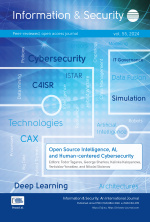Institutional Resilience and Building Integrity in the Defence and Security Sector
Source:
Connections: The Quarterly Journal,Keywords:
accountability, BI, Building Integrity, corruption, defense and security sector, Good governance, institutional resilience, NATO, TransparencyAbstract:
The concept of resilience in defense and security is evolving towards the inclusion of a wide-ranging and multi-dimensional set of vulnerabilities and associated mitigation strategies across the spectrum of military and non-military mechanisms of response. This article argues that while corruption and poor governance are now recognized as a security threat, as articulated in the NATO Warsaw Summit Declaration, the strengthening of defense and related security institutions in both Allied and partner countries remains to be further embedded as an integral part of the concept of resilience. Institutional resilience based on integrity, transparency and accountability is critical for ensuring the fulfilment of NATO’s resilience commitment and its baseline requirements, which include inter alia continuity of government with the ability to make decisions and provide services to the population. Corruption and poor governance undermine public trust and perpetuate instability and fragility. NATO’s Building Integrity policy contributes to the fulfilment of the Alliance’s three core tasks – collective defense, crisis management and cooperative security. NATO’s work on Projecting Stability vis-à-vis partners has recognized the role of good governance as a component of improving partners’ resilience. This needs to be further institutionalized through consistent efforts at strengthening defense institutions. The contribution of institutional resilience to NATO’s defense and deterrence task needs to be further conceptualized. The article argues for a more consistent approach to operationalizing Building Integrity as an integral part of the concept of resilience and the need for robust institutional capabilities to mitigate vulnerabilities stemming from the risk of corruption as a security threat.
